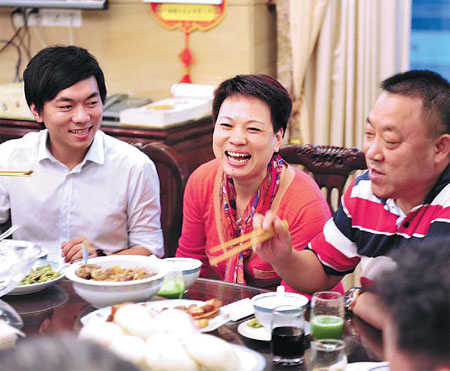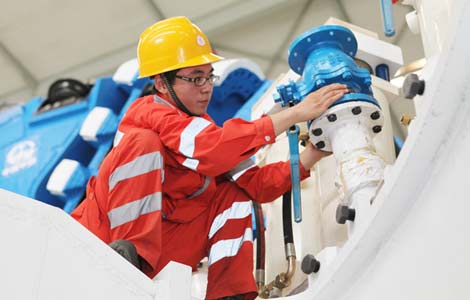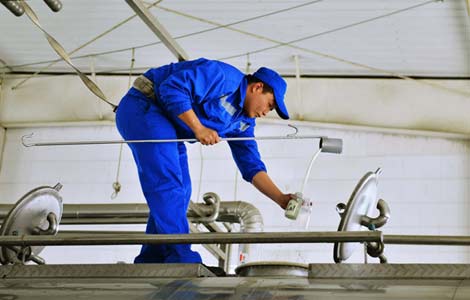Passing down the business
Updated: 2013-06-21 07:03
By Yu Ran (China Daily)
|
||||||||
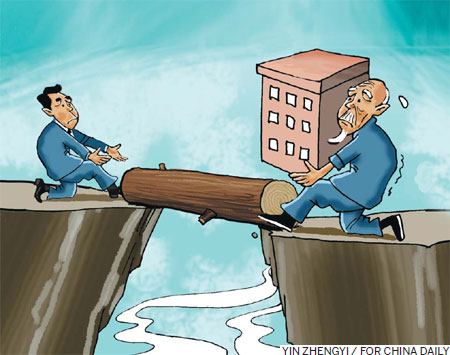
|
Yu Jiangbo (left), general manager of Zhejiang Neoglory Jewelry Co, has dinner with his parents. Yu has been working for his mother's company since 2008 after studying overseas for six years. Provided to China Daily |
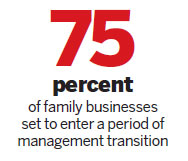
Next generation prepares to take over family enterprises, reports Yu Ran in Shanghai.
China's family businesses - which first emerged around 30 years ago - are facing many hurdles as they attempt to enter a new era, and part of the path to progress involves passing on the baton to the next generation of entrepreneurs.
In late 2011, about 85.4 percent of the country's private-sector enterprises were classified as family businesses, with 75 percent of them set to enter a period of management transition from the founders to their children during the next five to 10 years, according to a First Family Enterprise Development report released by the All-China Federation of Industry and Commerce.
In the coming decade, an increasing number of family businesses will prepare to face that challenge. The process may be a turning point for China's real economy - the manufacturing and services sectors - which is dominated by privately owned family businesses.
"The current primary goals for these 'second-generation' family enterprises are business transformation and upgrades, sustainability, accumulation, preservation and the inheritance of family wealth," said Pedro Nueno, president of the China Europe International Business School, speaking at a CEIBS Second China Family Heritage Forum, called "Social Emotional Wealth and Family Governance".
Like a huge number of enterprises in Wenzhou, Zhejiang province, Pan Jianzhong's company is a family business, launched by his mother in 1988 when she paid just 5,000 yuan ($816) to take over a debt-ridden shoe factory.
Pan, 43, has been involved in the business since age 19, when he chose to work on the production line after graduating from Shanghai Clothing, Shoes and Hats School.
After spending 12 months on the production line, Pan started work as a buyer, looking to source the cheapest materials, crossing the city every day by motorcycle to minimize his traveling expenses.
He also spent time as a traveling salesman to introduce the company's products to larger footwear companies. "I still remember the hard times when I rode through the city streets from dawn to dusk to source leather, and when I trekked to other cities but only sold one pair of shoes after two days' hard work," he said.
To prove his reliability and aptitude for the work, 23-year-old Pan used his own money to buy a number of secondhand machines from a shoe factory in Qingdao, Shandong province. He used the machines as part of a three-month trial to make a point to his mother.
The machines, all fitted on a single production line, produced goods of higher quality than usual and reduced the production time by 20 percent. Impressed, Pan's mother bought more machinery, increasing workplace automation and enabling the company to reduce headcount.
"I believed the only way to increase the size of the company was to use machines to manufacture products of more-consistent quality in less time. My mother was quite conservative and afraid to take the risk of spending a large amount of money on expensive machinery, which she thought unlikely to bring in higher profits," said Pan.
Since then, the company, Juyi Group, has expanded and employs about 5,000 people in Wenzhou. It produces 12 million pairs of shoes a year for clients all over the world. The company operates 20 computer-guided stitching machines and dozens of laser printers that work at roughly 10 times the speed of the traditional handcrafting process, and with 50 percent fewer employees.
Line of succession
"Convincing the older generation to change has always been a challenge for the second generation, who need to find an appropriate way of communicating with their parents to help them understand modern business concepts," said Roger King, director of the Tanoto Foundation Center for Asian Family Business and Entrepreneurship Studies at Hong Kong University of Science and Technology.
King said that as long as both the younger and older generations have the same goal of preserving "wealth, legacy and harmony", they will be able to find a balanced way to create a smooth line of succession for the family businesses.
Having been her father's little follower since she was in senior high school, 26-year-old Jin Huimin, the youngest child in her family, spent most of her childhood leisure time accompanying her father to business meetings and his day-to-day work.
"Although I've had limited management-related experience since graduating from Shanghai Normal University, I've witnessed the expansion of our family business by following my father and my two older brothers around since childhood," said Jin.
She now works as an assistant to her father, who is chairman of the family business - People Enterprise Group Co - a leading manufacturer of power-transmission equipment, high- and low-voltage electrical appliances, instruments and meters, electrical appliances for use in the construction industry and related accessories.
Jin said her introduction to management came at an early age, when her father told her that she should prepare to run the business with her brothers as a family unit.
To gain experience of life outside the family business, Jin took jobs as an intern in a bank and at other enterprises during her university vacations. She also worked as a teacher on the EMBA course at Shanghai Jiao Tong University for a year.
"I tried to learn how to communicate and work with others without being seen as the future boss of the company, so I would understand how the regular employees feel," she said.
Jin believes it's essential for business owners to foster a good relationship with their employees and guide them in showing a unified passion for the business.
Having worked as an assistant to her father for almost two years, Jin has learned about the overall operating process and is ready to gradually increase her involvement in the business, alongside her brothers.
Meanwhile, in 2010 the business began to diversify by investing in land used for industrial properties, and it also launched a logistics department as part of a structural upgrade.
"My oldest brother is in charge of the power-transmission section, my other brother is working on the electric appliances side, and I am trying to take over the property investment and modern service industry businesses," said Jin.

Gradual transition
Experts say it's essential that both generations prepare for the transition gradually.
"Family businesses should be prepared to pass on the succession to the next generation, which will directly lead to a promising future for the companies," said Nueno from CEIBS.
He added that business techniques, including management skills, leadership principles, financial management and a management philosophy should be passed from one generation to the next.
Unlike Pan and Jin, Yu Jiangbo, general manager of Zhejiang Neoglory Jewelry Co, hadn't experienced life as part of the family business until he started working at his mother's company in 2008, following six years studying overseas.
After graduating from the London School of Economics in 2008 with a masters degree in human resources management, he headed straight back to China to work as a sales manager for his mother's company.
"I've spent two and half years learning the overall operation of the business, getting used to negotiating with business partners and in discussions with my parents and experienced senior employees," said the 28-year-old.
He believes overseas study has taught him how to assimilate knowledge swiftly and has helped him to rectify the gaps in his skills base that resulted from six years away from the company and the Chinese business scene.
First-generation bosses realize the importance of knowledge, especially when enhanced by experience overseas, while the younger generation have the advantage of a relevant background in education or work experience overseas which provides an insight into the qualities required for entering the global market.
"Many younger family members, those born in 1970s or 1980s, and with experience of overseas education, have different characteristics and have led a comfortable life, unlike their parents," said Jean Lee, director of the CEIBS Kaifeng Center for Family Heritage.
Lee said many second-generation entrepreneurs who studied abroad lack contacts in, and experience of local business networks, and they should take time to combine Chinese business culture with their international perspective.
Like many other privately-owned enterprises in China, Neoglory Jewelry in Yiwu, Zhejiang province, is restructuring. It's transforming its core business and making the change from being a manufacturer and seller of cheap products to becoming a middle- and high-end brand making high-quality items.
"I have been persuading my mother to try something new, instead of remaining as a traditional manufacturer forever. She eventually took my advice after noticing that competition among manufacturers of low-end goods was too tough," said Yu.
During the past five years, Yu has worked on finding global business partners, such as Zara, H&M and Accessorize, and has introduced the company's branded products to them.
In addition, the company has launched branches in the United Kingdom, the United States and Dubai to expand its international business. It has also established an e-commerce platform, managed entirely by Yu, to promote its products globally.
"I am going to run the company in my own way to focus on brand-building. Meanwhile, the online platform will be expanded in the next five to 10 years," he said.
The company has also hired experienced, professional managers to offer advice on its operations. "I think we need to find someone from outside the family to lead the growing management team, while the managers can play an essential role in offering objective suggestions to assist with the operation of the business," said Yu, adding that he will apply modern management concepts to ensure that the transition is effective.
Meanwhile, Lee believes that a system of "family cohesion", including rules and guidelines in the decision-making process, should be set up within businesses to reduce the possibility of conflict between the generations.
"Over time, in another five to 10 years, the tensions between the generations will become easier; the second generation will have the desire to change the companies and the first generation will offer greater democratic opportunities to their children," said Lee.
Contact the writer at yuran@chinadaily.com.cn
(China Daily USA 06/21/2013 page6)
Most Viewed
Editor's Picks

|

|

|

|

|

|
Today's Top News
China slams US human trafficking report
China urges resumption of six-party talks
SEC charges China-based firm with fraud
Bank of China denies monetary default report
Snowden's future hangs in balance
China reiterates support for the UN
Dairy measures start at source
June PMI signals weakness
US Weekly

|

|
